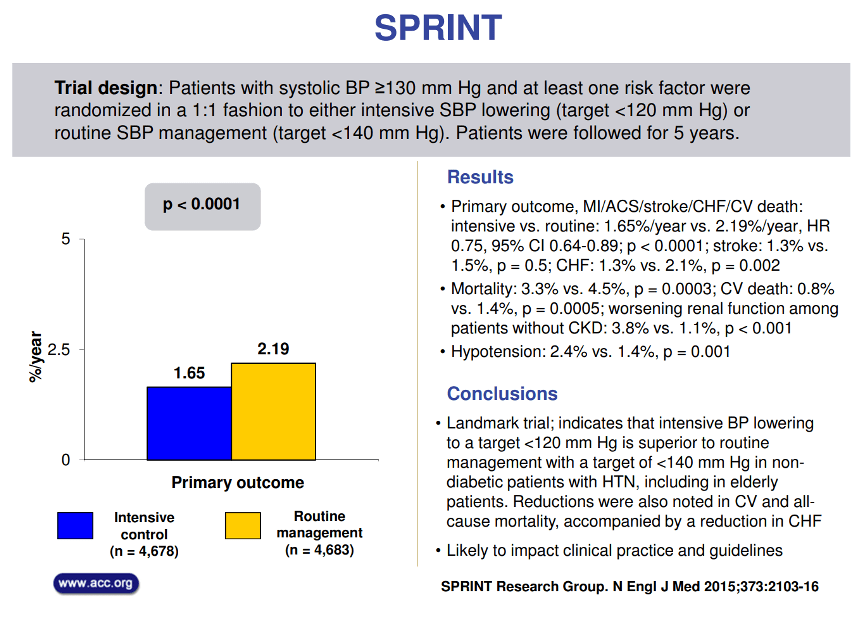By Dr Jonathan Shurlock, edited by Dr. Ahmed El-Medany
The Systolic Blood Pressure Intervention Trial (SPRINT) demonstrated the role of intensive blood pressure (BP) control in reducing cardiovascular morbidity and mortality. Jaeger and colleagues set out to identify the long-term “legacy” impact of intensive BP control, by carrying out a secondary analysis of SPRINT trial participants. Briefly (Figure 1), the SPRINT trial was a multi-centre randomised clinical trial carried out between November 2010 and August 2015 and included individuals over 50 with hypertension and increased cardiovascular risk (CV). Participants were randomised to systolic blood pressure (SBP) goal of <120 mmHg (intensive treatment group; n = 4,678) vs <140 mmHg (standard treatment group; n = 4,683). The trial was terminated early due to overwhelming evidence of benefit at a median of 3.3 years follow-up. The primary outcome, myocardial infarction (MI), acute coronary syndrome (ACS), stroke, congestive heart failure (CHF), or CV death, was significantly reduced in the intensive treatment group compared with the standard treatment group (5.2% vs. 6.8%, hazard ratio [HR] 0.75, 95% confidence interval [CI] 0.64–0.89; p <0.0001).
The authors of this secondary analysis included 9,361 patients and found that while there was an overall mortality benefit over 3.3 year follow up, this had disappeared at the median (IQR) total follow-up of 8.8 (8.3-9.3) years, (HR, 1.08; 95% CI, 0.94-1.23). The same was true for cardiovascular specific mortality.
In further subgroup analysis the authors found an increase in mean outpatient SBP in those randomised to intensive treatment. 132.8 mmHg (95% CI, 132.0-133.7) at 5 years to 140.4 mmHg (95% CI, 137.8-143.0) at 10 years follow up.
This work highlights the importance of interpreting trial results in the clinical setting in which they were performed. The authors demonstrate the lack of persisting effect of the intensive blood pressure treatment performed in the trial. Their takeaway message is the importance of long-term tighter blood pressure control in order to retain mortality benefits, a statement that adds to the debate of long-term blood pressure management.

Read the full paper here: https://jamanetwork.com/journals/jamacardiology/article-abstract/2797064
Read the original SPRINT article here: https://www.nejm.org/doi/full/10.1056/nejmoa1511939

